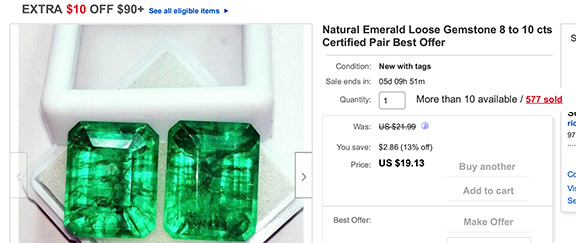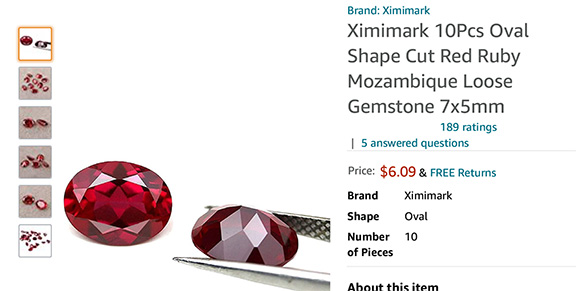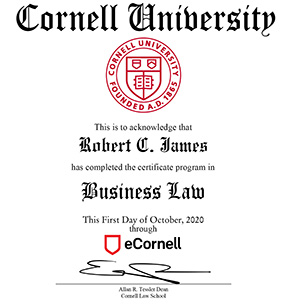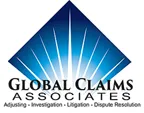How Ebay, Etsy, and Amazon use Section 230 to legally profit from fraud!
 Anyone who has spent time perusing the offers on Ebay®, Etsy®, or Amazon® knows that gemstone fraud is ubiquitous in these online websites. All three sites offer sellers the ability to sell to internet customers drawn in by their websites’ fame and promotions. Over the years I have made every effort to get them to respond to my questions of why they protect fraudulent gem sellers when they know full well that fraud is taking place. Today, I have the answer for us all as to why Ebay, Etsy, and Amazon can legally profit from fraud. Let us first review a couple of examples from my own purchases.
Anyone who has spent time perusing the offers on Ebay®, Etsy®, or Amazon® knows that gemstone fraud is ubiquitous in these online websites. All three sites offer sellers the ability to sell to internet customers drawn in by their websites’ fame and promotions. Over the years I have made every effort to get them to respond to my questions of why they protect fraudulent gem sellers when they know full well that fraud is taking place. Today, I have the answer for us all as to why Ebay, Etsy, and Amazon can legally profit from fraud. Let us first review a couple of examples from my own purchases.
Below is a purchase I made on Ebay in July, 2020. As covered in our newsletter of last summer, when I received these claimed emeralds from the dealer in India, along with the “Certification” from a gemological lab in India, they turned out to be color infused quartz. Totally fraudulent sale on every level. Look at how many the dealer had sold as of that date: 577. Now, let us look below at the numbers at the date of this newsletter.

In the next 8 months the seller sold an additional 150 of these with a gross sales profit of approximately US$2,800.00. All based on protected fraudulent selling on Ebay.

Before any of you gem dealers look at this and think: “Well, at that price everyone should know something is wrong!” That would be incorrect thinking. You must remove yourself from this as a dealer and look at it from a consumer. They trust Ebay. The seller claims natural emerald with certification. Surely Ebay would not allow this to be sold if it were fraudulent!
That is how consumers think, and why this continues. Well, almost why. Let us look at another example of a purchase from Amazon.
Below is the sales page for what is touted as natural Mozambique ruby. Pure and simple. As a consumer I read this and know that it is on Amazon, and surely Amazon would not knowingly allow a fraudulent sale, so as a new jewelry maker or hobbyist I jump at the chance to buy these 10 rubies for my collection. Problem is….they are cubic zirconia. You can see them in the image at the top of this page since I purchased this set and got it here in the Global Claims Associates office to test. Pure fraud by this seller. Given the number of reviews on this product as fake, Amazon is fully aware of the situation but continues to profit from the fraud.

 Most of you know that I spent the Covid-19 quarantine studying an online program of courses with Cornell University to earn the Business Law certificate from Cornell Law School. This gave me a opportunity to better understand the laws that govern business, and how those affect the jewelry industry, including business contracts and intellectual property rights law. I learned that within the many United States Statutes there exists something called the Communications Decency Act of 1996.
Most of you know that I spent the Covid-19 quarantine studying an online program of courses with Cornell University to earn the Business Law certificate from Cornell Law School. This gave me a opportunity to better understand the laws that govern business, and how those affect the jewelry industry, including business contracts and intellectual property rights law. I learned that within the many United States Statutes there exists something called the Communications Decency Act of 1996.
The law was supposed to provide a set of rules by which the internet would operate regarding dealing with objectional material such as pornography or hate material. The idea was to give providers of internet services immunity in case they had to remove objectionable material posted on their sites by outside users. Here is where this law has created such problems.
First, what is the definition of “objectionable material”? If you wonder why Facebook and Twitter can arbitrarily remove posts or people from posting without any sort of recourse by the people, it is because of the Communications Decency Act. This gives Facebook, Twitter and other venues total autonomous control and complete immunity to remove anyone they choose, censor any content they choose, and do anything they want with posts based on their own, private definition of “objectionable material”. This allows these huge venues to legally censor at will, removing one of the most cherished tenets of the United States Constitution’s First Amendment regarding Free Speech. The United States Constitution guarantees free speech, but the Communications Decency Act specifically takes away free speech.
But what about Ebay, Etsy, and Amazon? How does 47 U.S. Code allow these internet sellers to simply look the other way at the gemstone fraud they know is taking place on their venues? Tucked inside Chapter 5 of the Communications Decency Act is Section 230. Within this Section 230 is a specific paragraph that allows Ebay, Amazon and every other internet seller to allow fraud to take place with no worry about recourse or responsibility to the buying public. To quote:
47 U.S. Code § 230 – Protection for private blocking and screening of offensive material
47 U.S. Code § 230 – Protection for private blocking and screening of offensive material
(c)Protection for “Good Samaritan” blocking and screening of offensive material
(1)Treatment of publisher or speaker
No provider or user of an interactive computer service shall be treated as the publisher or speaker of any information provided by another information content provider.
To put it in plain English, if you operate an online selling venue, you are not legally responsible for fraudulent selling done on your venue. Forget morals, forget good faith, forget honesty in business. Ebay and Amazon can profit millions of dollars from fraudulent sales on their venues, and they cannot legally be held liable for any of the fraud…but get to keep the profits from the fraud.
Here is the part that is like fingernails on a chalk board to this investigator: the Indian dealers, Chinese dealers, Thai dealers, and many others have figured this out. No law enforcement in the United States or any other country outside the seller’s home country has the jurisdiction to prosecute a seller for fraud. And no US consumer is going to spend the money to hire an attorney in India to litigate a fraud perpetrated on Ebay. These dealers in far off places, and the owners of Ebay and Amazon know the United States Congress has given them a free pass to allow heinous fraud on their internet sales channels, and the venues profit from it. That is how Ebay, and Amazon can profit from sales fraud. And make no mistake, the profits are huge.
Conclusion
In 2020 the Trump administration made a good faith attempt to amend Section 230 of the Common Decency Act to correct the above situation. However, the Democrat Party led US Congress voted it down so the door to fraudulent profits for Ebay and Amazon remains wide open. That is not a political statement, it is a simple statement of fact.
For all of you who wince, cringe, and get pissed-off whenever you look at gemstone offers on Ebay, Etsy, or Amazon and think to yourself: “How the hell can they get away with that?”
Now you know. And you should also know that none of the major industry organizations like the AGTA, JVC, Jewelers of America, or anyone else appear to be making any effort to voice the issue to the government on behalf of you, the home-town, independent retail jeweler and appraiser.
That needs to be changed.
Robert James FGA, GG
President, International School of Gemology
Global Claims Associates
Member: National Association of Independent Insurance Adjusters
Member: Insurance Appraisal and Umpire Association
Associate Member: American Bar Association

